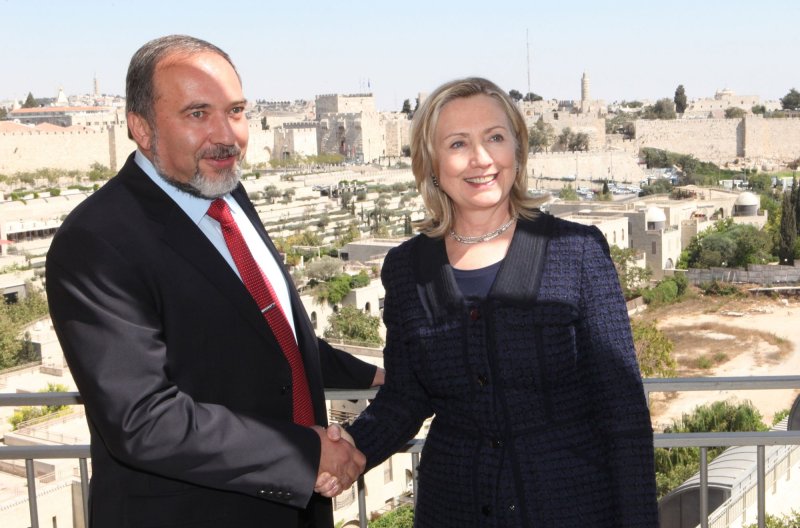U.S. Secretary of State Hillary Clinton (R) shakes hands with Israel's Foreign Minister Avigdor Lieberman as they stand on a balcony during their meeting in Jerusalem on September 15, 2010. Jerusalem's Old City is seen in the background. Israeli and Palestinian leaders are "getting down to business" and tackling the main issues of the Middle East conflict, Hillary Clinton said on Wednesday. UPI/Yossi Zamir/Pool |
License Photo
TEL AVIV, Israel, Oct. 14 (UPI) -- The Israeli Cabinet's endorsement of a draft bill requiring all future non-Jewish citizens to pledge allegiance to a "Jewish and democratic state" is fueling the growing alienation and radicalization of the country's Arab minority.
One Israeli Arab lawmaker says racism in Israel, where Arab citizens comprise one-fifth of the 7 million population, has reached "frightening levels" in recent years.
The draft bill is subject to approval by the Knesset, Israel's parliament.
In the current climate of growing hostility between the two communities, Palestinian political activist Jafar Farah noted in June that "23 bills have been submitted in one year by Knesset members that further the discrimination against our community."
Farah, director of the Mossawa Center, one of several non-governmental organizations that advocate equal rights for Arabs, declared, "This is, for us, the worst Knesset since the establishment of the state of Israel."
Two of those pieces of legislation in particular have stirred outrage among Israel's Arab minority, who claim they are treated as second-class citizens.
One sought to prohibit Arabs marking the day Israel declared its independence, May 15, 1948, as a day of mourning, with violators punishable by three years' imprisonment. On that anniversary, Palestinians traditionally commemorate what they call the Nakba, Arabic for "the catastrophe."
The original draft of the loyalty bill was formulated by Israeli Foreign Minister Avigdor Lieberman's far-right Yisrael Beiteinu Party.
Lieberman, a voluble hard-liner in Prime Minister Binyamin Netanyahu's coalition Cabinet, has advocated the expulsion of Israeli Arabs in northern Israel to the West Bank.
The draft was eventually diluted in the Knesset, largely on legal considerations, to ban any Nakba commemoration using state funds. But it is still seen by Arab Israelis as an abhorrent infringement of their civil rights as Israeli citizens.
The Higher Arab Monitoring committee, which coordinates political activities by Israeli Arab political parties and organizations, declared the final bill "would infringe on freedom of expression and increase extremism and division between Israeli citizens of Jewish and Arab descent."
The second bill makes it a crime to publicly deny Israel's existence as a Jewish and democratic state, punishable by up to a year in prison. It has received initial approval by the Knesset.
In June, a report conducted by renowned sociologist Sammy Smooha of Haifa University, part of an annual "index of Arab-Jewish relations," indicated a growing alienation by Israel Arabs from the state and its Jewish majority.
The report found, among other things, that the number who identify with the Palestinian people has risen from 18.8 percent to 32 percent, and that support to achieve political objectives using "all means, including violence," jumped from 5.4 percent to 13.9 percent.
Smooha concluded that relations between the two communities have gone downhill since the peace process collapsed in 2000, when the Palestinians launched the second intifada, or uprising, and the wars and terrorism that followed.
"By any account, this was a lost decade for coexistence between Arabs and Jews," he observed. "The situation worsened and bodes badly for the future of their relations."
The 2009 elections heightened Arab anger and frustration. The polling produced severe setbacks for the Israeli left wing, which has traditionally been seen as more sympathetic to the Palestinians, and a big surge by right-wing extremists such as Lieberman's anti-Arab party which campaigned on such slogans as "no citizenship without loyalty."
On Friday, some 6,000 Arabs marched from the Galilee town of Kfar Kana to commemorate riots that erupted in October 2000, following the start of the so-called al-Aqsa intifada. Thirteen Israeli Arabs were killed by Israeli police during the disturbances.
No one has been held responsible, or put on trial, for the killings, which has become a contentious issue for Israeli Arabs who say the authorities have made no effort to properly investigate the events. They demand the indictment of the officers involved.
Israeli Arab Knesset member Ahmed Tibi of the United Arab List declared that since the 2000 riots the level of racism in Israel "has reached frightening levels … These past 10 years … represent a black mark on the history of the state of Israel."





